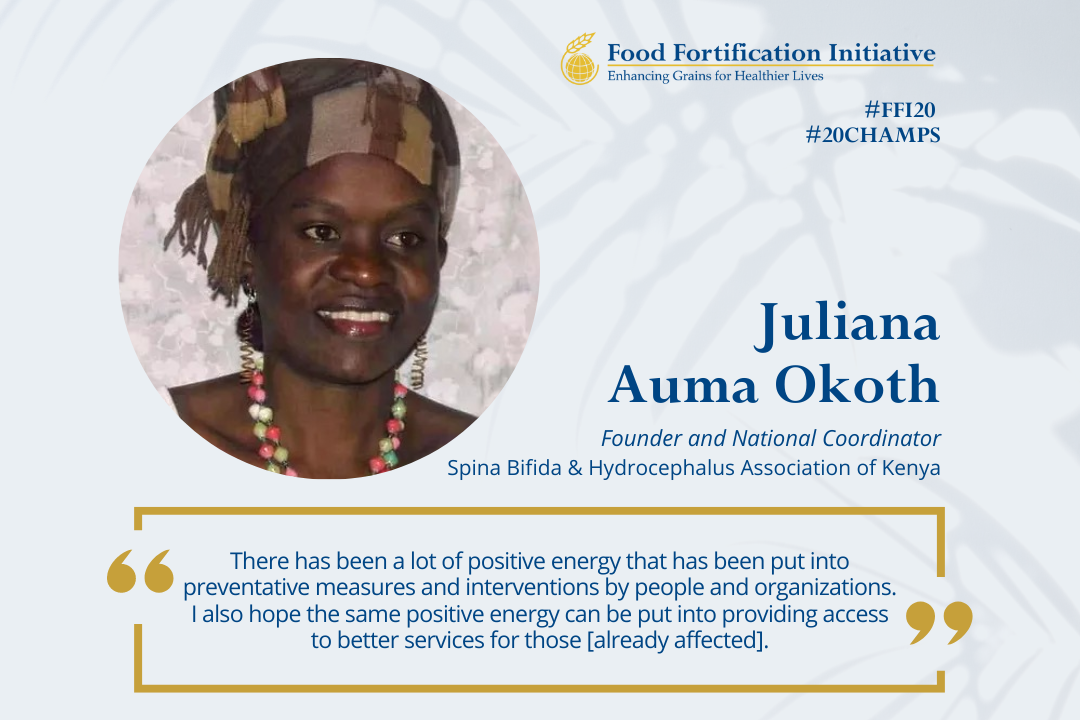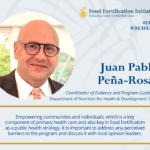Founder and National Coordinator of Spina Bifida & Hydrocephalus Association of Kenya

FFI: How did you become interested in nutrition?
Juliana: I became interested in nutrition when I had my daughter. She was born with spina bifida and hydrocephalus. I later learned that women could prevent spina bifida if you have enough folic acid in your blood before and after conception.
FFI: What inspired you to become involved with food fortification?
Juliana: What inspired me is the fact that we really focus more on care, and for me care is a very heavy burden for both families and the society at large. When I learned about the aspect of prevention through food fortification, I was really excited, and I wanted to speak about it.
FFI: How is your country prioritizing fortification?
Juliana: There’s a strategic plan that was launched in Kenya, a five-year strategic plan on food fortification, and we were so excited because this was done by the government. The plan is to increase production and consumption for fortified foods within Kenya, ensuring there’s a policy on mandatory fortification of all staple foods by 70% with the right amounts of vitamins and minerals.
FFI: What health outcomes do you expect fortification to improve in your country?
Juliana: I will share one that is very close to my heart: that there will be a significant reduction in the prevalence of children born with spina bifida and other neural tube conditions in Kenya. For me this will reduce the huge burden of care, because caring for children with a neural tube condition is a full-time job that impacts the ability of a caregiver to earn an income, and most families are extremely poor. When a child is born with one of these conditions, the entire household is affected negatively.
FFI: In your experience, what are the main components to a successful fortification program?
Juliana: I think it is important to include experts such as researchers, because when you talk about food fortification it is a very technical term. Not many people understand it, even those who are affected. It is important also to include policy makers in the program because these are the duty bearers who are also key decision makers, much like the Ministry of Health in Kenya.
FFI: What are the greatest challenges you have encountered in planning or implementing fortification programs? And how did you address those challenges?
Juliana: I think people believe that when they take their food, they already have all the nutrients, and there’s a disregard to the adverse effects of micronutrient deficiencies. We need to take an approach where, when we advocate for food fortification, we advocate using a research-based approach.
FFI: What can we do as a society to continue strengthening fortification efforts?
Juliana: There’s a lot we can do. One thing we can do is to increase consumer awareness on the importance of regular consumption of fortified foods. We can help [people] know that the micronutrients included in fortified foods are safe and not carcinogenic. We can also include people who have been affected by micronutrient deficiencies as brand ambassadors of fortified foods.
FFI: If you were not working in nutrition, what do you think you would be doing?
Juliana: I think I would still be working in nutrition, because for me my life literally stopped for 10 years after I had my daughter. I knew nothing, absolutely nothing about food fortification when I became pregnant with my daughter.
FFI: Is there anything else you would like to share?
Juliana: There has been a lot of positive energy that has been put into preventative measures and interventions by people and organizations. I also hope the same positive energy can be put into providing access to better services for those who are already negatively affected and who may be struggling in life, those who may have not known how to prevent these conditions.
This interview is part of the #FFI20 Champions campaign, a celebration of fortification heroes who have helped build a smarter, stronger, and healthier world by strengthening fortification programs over the past 20 years. To read interviews with other champions, visit the #FFI20 Champions campaign homepage.



